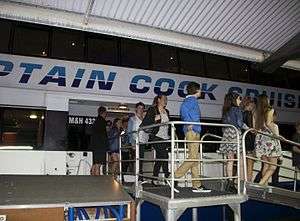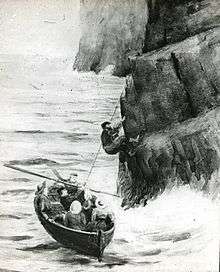Disembarkation
| Look up debarkation, debarcation, disembarkation, or disembarcation in Wiktionary, the free dictionary. |

Disembarkation or debarcation is the process of leaving a ship or aircraft, or removing goods from a ship or aircraft. (debark: from the French des meaning "from", and, barque, meaning "small ship").[1][2]
Civilian
The loading and unloading of cargo has traditionally been handled by stevedores, also known as longshoremen, wharfies, etc. Today, the vast majority of non-bulk cargo is transported in intermodal containers,[3] which are loaded and unloaded using specialized cranes.[4]
People normally board and depart a ship via a gangplank (gangway), a movable structure usually consisting of a ramp with stairs and railings. The gangplank may lead to either a dock or a small boat (or lighter) that connects to the shore. Accidents during disembarkation are most often due to being struck by a rope (line), railing or other item due to the ship's motion, or attempting to avoid such items. The second most common cause is slipping or tripping on the gangway.[5]
Military
Military debarking procedures, even in non-combat zones, can be quite complex.[6][7] In addition to routine operations, debarking can be conducted under fire as part of amphibious assaults, such as that of the Normandy landings during World War II. In such cases, it is vital that cargo be loaded so it can be unloaded in the order needed, rather than simply to maximize the use of space. This is called combat loading. Landing craft are used to transport both troops and cargo to the shore.[8]
See also
- Glossary of nautical terms
- Embarkment
- Boarding (transport)
-
 Nautical portal
Nautical portal
References
- ↑ "Lakes Ponchartrain and Maurepas Chart 11369 Booklet Chart Commemorative Edition" (PDF). 4 April 2012. Retrieved 2014-06-07.
- ↑ "United States Marine Corps" (PDF). Retrieved 2014-06-07.
- ↑ Marc Levinson (2006). The Box, How the Shipping Container Made the World Smaller and the World Economy Bigger. Princeton Univ. Press. ISBN 0-691-12324-1.
- ↑ George, Rose (2013). Deep sea and foreign going: inside shipping, the invisible industry that brings you 90% of everything. London: Portobello Books. ISBN 978-1-84627-263-9.
- ↑ Office of Marine and Aviation Operations (2013). "Safety News: Gangway Safety" (PDF). Washington, DC: United States National Oceanic and Atmospheric Administration (NOAA). Archived (PDF) from the original on 2013-02-14.
- ↑ Furse, George Armand (1888). Embarkation and Disembarkation of Troops. Holbroook & Son: Holbroook & Son. OCLC 774601520.
- ↑ American Expeditionary Forces (1917). Provisional instructions on disembarkation, entraining and detraining of troops in France. Washington, DC: United States Army. OCLC 18529496.
- ↑ The United States Service Magazine - Volume 2 1864 - Page 538 "The actual disembarkation is a matter of difficulty and labor under all circumstances, but in presence of the enemy it becomes one of extreme delicacy. If the troops must debark in boats, the fleet should carry a convenient number of launches
